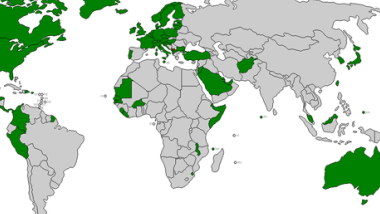Scholars, diplomatic services and media around the world have spent this past month writing analyses and official reactions to the case. As a result, there is a large amount of very recommendable articles on the web. I will just try to focus on the comparative dimension of the consequences of the court’s opinion.
The advisory opinion
Experts agree that the court was very careful to not state any general doctrine about self- determination or the access to independence. Nevertheless, the opinion of the court is clear and it has no precedent. It states that the unilateral declaration of independence violated no international law, and additionally it makes clear that the episode did not violate any of the UN Security Council resolutions about the international administration of the territory.
In essence, the reasoning of the Court applies - to a practical case - something that legal and political theorists have traditionally said, that Law cannot be applied before the existence of its subjects, because its function is to regulate the relations among them. Therefore, mutatis mutandis, international public law cannot be applied before the constitution of their subjects, which have conventionally (yet not exclusively) been the states. In practice, this is more complex than it seems, but on a theoretical level, it belongs to an unquestionable reason: Law is an instrument of politics. Of course laws have an effect on political phenomena, but it is only after the political structuring of power that law makes sense in society.
Thus, the advisory opinion is not universally applicable. However, intentionally or not, the Court established a new doctrinal line that might make it a lot more difficult for the states to oppose independence movements within its territory with legal arguments. Of course, the internal legal systems will almost always be applicable, but it will not be possible to call upon the international law.
Law cannot be applied before the existence of its subjects, because its function is to regulate the relations among them.
Careful comparisons
Unsurprisingly, this news has had a special relevance in those territories of Europe that have a secessionist movement or national political conflicts. In Barcelona, it has been followed with special interests. Yet contrary to what someone might think, no relevant media group or political party has tried a direct comparison between Kosovo and cases like Catalonia, Flanders or Scotland. Despite some minority reactions, there has been a general agreement on carefulness and moderation when comparing the situations. Working out a valid comparison between Kosovo and anywhere else demands a complex adaptation of political concepts according to their contexts. Doing it in another way would lead to important mistakes, because when we speak about political phenomenon, we only can understand them within specific constraints. This makes impossible to apply the same context, with the same meaning, to very different places.
Presently, it is self-evident that the message of the court has also been interpreted as a very positive advance in the legitimacy of pro-independence ideals, and the doctrinal line that it has opened will have consequences on the political discourse of the groups supporting these ideals. In Spain, for example, there has been controversy regarding the non-recognition of Kosovo because it has been associated with its own centrifugal tensions. While it is evident that no comparison is possible for practical political meanings, it is also true that what can be distilled out of the Court’s text does not necessarily take into account the specific circumstances of location and time, because as jurisprudence of the ICJ, it is only an overarching source of international law.
Nonetheless, this opinion is far from being a final solution. There is still a long way to go before the Serbian and Kosovar government find a stable position. This fall, the centre of gravity will be around two points: (1) on the international stage, Kosovo will try to gain more recognitions (which will not be easy even if the majority of the General Assembly recognises it because, for instance, Russia is supporting Serbia for its own benefit as regional superpower), and (2) on the ground, the future of the northern villages of Kosovo (with Serbian majority) continues to be an important key for the resolution of any possible negotiation between the two parties.




1. On 13 September 2010 at 10:58, by Syed Qamar Afzal Rizvi Replying to: International Court of Justice: Kosovo ruling
Replying to: International Court of Justice: Kosovo ruling
As an independent researcher in the field of international relations, I would like to extend my candid view regarding the hereinabove mentioned topic.The veritable fact is that there may be diversity of opinion with regard to the ICJ’s ruling on Kosovo;but one has to keep in mind while assessing the merit of the Kosovo case that the doctrine of equality in terms of law seems no to be contradictory to the norms of international law established by the UN Charter.The theory of mutasis mutandis - justification of a case or law pertaining to different situations and circumstances- is itself an important instrument of law.The independence of Kosovo-protected defended by the UN-the EU and now by the ICJ-correctly reflects the message that the protection of human rights has been the prime focus of the international institutions that have been the ardent supporters of Kosovo’s independence.
Follow the comments: |
|
